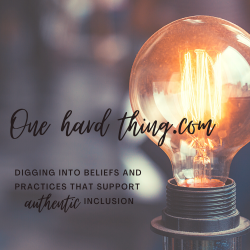Sometimes we want to do more than one hard thing at a time. Anyone who is a parent is familiar with this particular dilemma. We want to be present for our youngsters. Really see and know them and respond as the ideal parents we envision ourselves to be. However, we also very badly need to keep our youngsters’ worlds orderly, stocked with supplies, paid for, and functional from a life preservation sort of perspective. We can’t always play with, when we’re caring for. This is a double-bind. I’m bound to do two things at once, and the two things are at odds with each other.
Trying to fulfill these sorts of mutually exclusive roles is a major reason we burn out, pull out, flake out, or just plain flame out. We can’t win. We may do well at one role, but we know it’s at the expense of the other, and the guilt can rip us up. Frequently has, in my case!
Think about a double bind you were in today. I bet there were several. It may have been an important text that came while you were driving. Or the distress on a co-worker’s or family member’s face about something you knew required support, even as you tried to finish a task on a tight deadline. It could have been knowing you were too hungry to function, but you had promised yourself you were going to be “healthy” and wait for that next meal. It could have been trying to please both your employer and your client at the same time, when neither wanted the same thing. Or it could have been trying to get through the shopping trip to buy the food that your toddler needed to eat in order to stop screaming, but which was not yet available to give her, because you were trying to buy it! It could have been the even more difficult choice between self-care, and care of another who seemed to need it just a bit more than you did.
Double-binds seem to tear something inside us into two pieces, and that tearing sensation is hard to locate, but very much in evidence when we get a chance to sit still, by ourselves, and evaluate our day. Double-binds make it impossible to feel we got it right, even though we’re so tired, did so much, worked so hard. Gave 110%.
Much like any mindfulness guru will tell you, naming the enemy is half the battle. Maybe more. If we can spot our double-binds, at least we know what it is that is causing us additional stress, over and above the fatigue that normally comes from a hard day’s work.
Double-binds are everywhere. But I don’t believe they are necessary. What they tell us is that we have not yet solidified a values hierarchy. We are experiencing conflict as two deeply held values are competing for the top spot in our brains, and bodies, and minds. We want to hold them up side by side as equals, but they aren’t playing nicely.
It’s great that we have values, but there is no universe where our values can all be the most important. Especially when we are dealing with human (messy) situations. We have to prioritize our values. Some will need to be placed above others. That’s just a fact. It is situation-specific, for sure, but situations require us to know what we believe to be our primary purpose as we navigate through them. Otherwise, we will stall out, or behave in inconsistent and incredibly frustrating (to ourselves, and to others) ways.
Driving while owning a phone is a good example of this. Communicating in a timely manner is a high value for many of us, especially in certain networks such as work, family, or caring for dependents. We want to be responsive, and also know what’s going on as soon as it is possible. However, staying safe and alert on the road may need to trump that very legitimate pressure. Think about it. One will make us popular, or efficient, or productive. The other will keep us, and others, alive.
It comes down to this very cold appraisal once we see a double-bind for what it really is – a clash of two good things for the position of the most important and best thing. It’s possible to believe and hold to many values, but they need a clear and consistent framework (some sort of algorithm? or maybe just a code) for when conflict between them happens. And it does all the time. Think about privacy and confidentiality vs. the need for public safety during a pandemic. Think about fiscal responsibility vs. the homelessness crisis. Think about opioid addiction and the risk of tainted drugs vs. handing out clean supplies to addicts. Nothing is obvious. There’s no “right” hierarchy. But there needs to be a hierarchy. Without one, we wander in circles, getting tired, and not getting anything done. We can even do harm by muddying a decision and thereby succeeding at neither possible outcome.
However, once there is a clear and coherent hierarchy of values in place, double-binds lose their power. They become exercises in actualizing what we believe. Not a guilt trip. Just a way to decide what is most important in this particular scenario, while remaining true to our (pre-decided and thus integral) core beliefs and identity and purpose. And hierarchies do not (despite sad evidence based on abuses of power) have to mean that we are less respectful of the values we place lower on the scale. This is a sorting that can be highly nuanced, responsive to context, and evergreen, while we’re at it. Who do we want to be? Where do we want to go? A sorting of values will help us figure out how we’re doing in getting there. If it’s working, we’ll know. If it’s not, we can change it, because we’re living our life in a reasoned and reasonable manner.
Spotting double-binds can even become kind of fun, once you get the hang of it. Why am I tense and feeling so unable to move forward? What is it (or what are the two or more outcomes – red flag!!) that I’m really trying to accomplish? In other words, are there two paths I’m trying to walk down, at the same time, leading in two different directions?
Do yourself a favour. Stop. Calculate the two good things, the two hard things you want to do at the same time in this moment. Now, just choose the most important, based on your unique perspective, beliefs, and inner compass, right now. That’s it. You don’t have to say the other isn’t good, or valuable, or very important. It just isn’t the most important to you in the place you’re in right now.
Then commit, and let the other choice wait. It’s okay. You will survive. It will survive! And you can do that other thing later, in its own most important space and time, now that you know it’s jockeying for position. By slowing down in this way, you not only save energy, but you will have a shot at congruence with your own beliefs and intentions that you can feel self-respect for as you think it over later. No, it’s not as satisfying as if you could have done both things well. But none of us can. We’re only human. We can only do one hard thing at a time.
In this one moment that is your present, make it your best hard thing.


